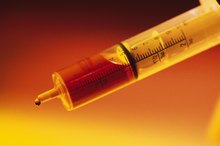What Are the Causes of High Muscle Enzymes?
Enzymes are proteins produced within cells that enable them to carry out their metabolic and biological functions. Muscle cells contain a variety of enzymes with particularly high concentrations of those involved in generating energy to power the muscles. When muscle cells are damaged, these enzymes leak into the bloodstream and may causes elevated levels. A variety of diseases and conditions can cause high muscle enzyme levels. Some are temporary and pose no long-term health risk but others are potentially life threatening.
If you are experiencing serious medical symptoms, seek emergency treatment immediately.
Muscle Diseases and Conditions
A variety of muscle diseases and conditions can elevate muscle enzyme levels. Vigorous or strenuous physical activity -- particularly if you're unaccustomed to it -- can transiently increase muscle enzyme levels. Muscle trauma due to participation in contact sports or an accident also commonly causes a temporary elevation in muscle enzyme levels. In most cases, transient muscle enzyme level increases related to overexertion or mild muscle injuries pose no long-term health risk.
Certain muscle diseases are associated with elevated muscle enzyme levels, reflecting underlying muscle damage. Examples include:
- A variety of muscle diseases and conditions can elevate muscle enzyme levels.
- Certain muscle diseases are associated with elevated muscle enzyme levels, reflecting underlying muscle damage.
Systemic Diseases
How to Lower High Muscle Enzyme Levels
Learn More
Many systemic diseases -- those that have widespread effects in the body -- lead to deleterious effects on the muscles that can provoke muscle enzyme elevations. Examples include:
Other Causes
There are other potential causes of elevated muscle enzyme levels 3. An example of particular concern is a heart attack, in which a sudden blockage in blood supply to the heart leads to death of heart muscle cells in the affected area. While most heart attacks cause chest pain or discomfort, some do not. These so-called silent heart attacks are sometimes detected due to elevated muscle enzyme levels.
Some prescription medications can also elevate muscle enzymes levels, although usually not dramatically. Examples include cholesterol-lowering statin medications, and certain medicines for heart disorders, Parkinson disease and HIV, among others.
Additional possible causes of elevated muscle enzyme levels include:
- Recent generalized seizure, intramuscular injections or surgery
- Multiple wasp or bee stings
- Peripheral artery disease, especially affected the leg muscles
- Malignant hyperthermia, which is a rare complication of general anesthesia
- Gangrene
- Certain inherited metabolic or enzymatic disorders
- There are other potential causes of elevated muscle enzyme levels 3.
- Additional possible causes of elevated muscle enzyme levels include: * Recent generalized seizure, intramuscular injections or surgery * Multiple wasp or bee stings * Peripheral artery disease, especially affected the leg muscles * Malignant hyperthermia, which is a rare complication of general anesthesia * Gangrene * Certain inherited metabolic or enzymatic disorders
Considerations, Warnings and Precautions
What Does a High SGOT in a Liver Function Test Mean?
Learn More
The term muscle enzymes is somewhat misleading as the enzymes that occur in muscles also occur in other body tissues. Therefore, elevated levels of so-called muscle enzymes might actually be due to a disease or disorder affecting another type of tissue or organ, such as the liver, brain or kidneys. Determining the cause of elevated muscle enzymes usually involves additional blood tests. Your doctor might also order other diagnostic tests.
See your doctor without delay if you experience muscle-related signs and symptoms, such as weakness, pain, soreness or muscle wasting. Seek emergency medical care if you experience difficulty breathing or muscle weakness that develops rapidly.
Reviewed and revised by: Tina M. St. John, M.D.
- The term muscle enzymes is somewhat misleading as the enzymes that occur in muscles also occur in other body tissues.
- See your doctor without delay if you experience muscle-related signs and symptoms, such as weakness, pain, soreness or muscle wasting.
Related Articles
References
- Current Opinion in Pharmacology: Drug Induced Rhabdomyolysis
- Skeletal Muscle: Idiopathic Inflammatory Myopathies -- Pathogenic Mechanisms of Muscle Weakness
- Deutsches Ärzteblatt International: Creatine Kinase Levels After Exercise
- Frontiers in Neurology: Stepwise Approach to Myopathy in Systemic Disease
- Deutsches Ärzteblatt International: Treatment Options for Statin-Associated Muscle Symptoms
- BMJ: Investigating Mildly Abnormal Serum Aminotransferase Values
- Mayo Medical Laboratories: Creatine Kinase (CK), Serum
- Mayo Medical Laboratories: Aldolase, Serum
- Cleveland Clinic Journal of Medicine: Approach to Asymptomatic Creatine Kinase Elevation
- Finsterer J, Löscher WN, Wanschitz J2, et al. Secondary myopathy due to systemic diseases. Acta Neurol Scand. 2016;134(6):388-402. doi:10.1111/ane.12576
- National Institute of Arthritis and Musculoskeletal and Skin Diseases. Basic facts about muscles. Updated July 2019.
- Biga LM, Dawson S, Harwell A, et al. Chapter 10. Muscle tissue, In: Anatomy & Physiology. XanEdu Publishing Inc; 1st edition; 2013:976-984
- The Myositis Foundation. Polymyositis
- The Myositis Foundation. Dermatomyositis
- Centers for Disease Control and Prevention. What is muscular dystrophy? Updated December 2, 2019
- Myasthenia Gravis Foundation of America, Inc. MG facts
- The ALS Foundation. What is ALS?
- Medline Plus. Rhabdomyolysis. Updated July 16, 2019
- American Heart Association. What is cardiomyopathy in adults? Updated March 31, 2016
- Finsterer J, Löscher WN, Wanschitz J2, et al. Secondary myopathy due to systemic diseases. Acta Neurol Scand. 2016;134(6):388-402. doi:10.1111/ane.12576
- Santilli V, Bernetti A, Mangone M, et al. Clinical definition of sarcopenia. Clin Cases Miner Bone Metab. 2014;11(3): 177–180. doi:10.11138/ccmbm/2014.11.3.177
- The IQVIA Institute for Human Data Science. Understanding neuromuscular disease Care. 2018.
- Brigham and Women’s Hospital. Electromyography
Writer Bio
Dr. Shavon Jackson-Michel is an expert in the field of health and wellness and has been writing for LIVESTRONG.COM since 2009. She is a university-level professor and a licensed naturopathic physician providing individualized consultations on natural and holistic approaches to chronic disease at her Bloomfield, NJ office. Dr. Jackson-Michel is a doctoral graduate of the University of Bridgeport College of Naturopathic Medicine.









